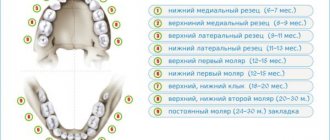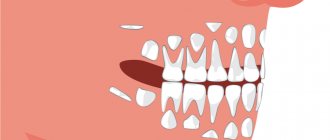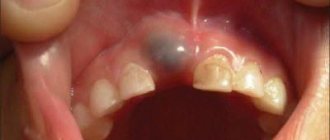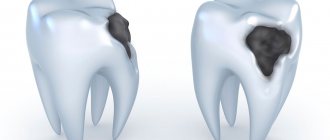No teeth at one year of age
Why does a child’s teeth not grow after a year of life?
- Hereditary predisposition.
- Unsuitable climate.
- Poor quality of food and water.
- Diseases and infections.
- Vitamin and calcium deficiency.
To dispel or confirm suspicions, you need to take your baby for examination to a therapist and dentist. To determine the causes of delayed jaw development, blood tests, urine tests, ultrasound examinations of organs, and testing of thyroid function may be necessary. To exclude edentia (lack of teeth) from the diagnostic field, fluoroscopy is performed.
Why a one-year-old child has no teeth: reasons
Vitamin D and calcium have virtually no effect on the timing of the appearance of the first teeth. These factors have a greater impact on the quality of teeth and enamel. The reasons why a baby has no teeth at one year can be:
- genetic factors, if the parents had late teeth, then their baby is also likely to have the same problem
- oddly enough, even climatic conditions can influence this process; in a warm climate zone, children’s teeth grow better
- a lot depends on the quality of water, nutrition
- Severe infectious diseases negatively affect the rate of tooth growth
- lack of vitamins and calcium can slow down this effect
If at the age of one and a half years the baby does not have a single tooth, then he needs to undergo a comprehensive examination. Sometimes teeth do not grow due to pathology - adentia .
How many teeth should a child have before 1 year of age?
Initial signs of teething, as a rule, appear at six months of age: active salivation, inflammation of the gums, refusal to eat. During this period, the lower incisors begin to break through, which is accompanied by swelling, diathesis, tearfulness, drowsiness, runny nose, cough, fever and even vomiting, diarrhea or constipation. Symptoms disappear 3-7 days after the exacerbation.
Eight- and nine-month-old babies grow up to six teeth. As a rule, the lower incisors are already fully formed, and the upper ones are just beginning to develop. The child learns to chew and bite food independently.
At 10-11 months, as a rule, the incisors of both rows are already formed in the mouth, and adjacent teeth are also breaking through. At this time, after eating food, it is recommended to give the baby water. To avoid caries, you should not accustom him to sweets. Maintain hygiene and cleanliness of the pacifier and spoon from which you feed your baby. If a child’s lower front tooth does not grow at this age, there is no need to panic - experts define this situation as standard and not requiring intervention. To get rid of false suspicions, you can go for a medical examination. Our VTV clinic is always happy to help with any dental problem.
Over 1 year old
At one year of age, children, as a rule, already have eight full milk teeth in their mouths. This age limit is the optimal time to visit the dentist. The doctor will evaluate the condition of the oral cavity and help prevent problems.
At the age of 1.5-2 years, a child can have from 4 to 14 teeth. We must begin to accustom him to oral hygiene, showing him how cleaning is done by example. By the age of 2.5 years, children, as a rule, acquire two dozen milk teeth, which serve them until the age of 5-6 years. A visit to the dentist or orthodontist may be necessary if:
- premature development of the jaws, which is facilitated by endocrine dysfunction;
- growth retardation, often caused by rickets, digestive problems, infections and genetic inheritance;
- incorrect position of the incisors, indicating deeper bone disorders.
Until the age of six, the number of teeth remains the same - about 20. At this time, you need to continue to develop in the child a love of oral hygiene, wean him from finger sucking and nail biting.
The first replacement of baby teeth with molars begins at 6-8 years of age. By the age of 14-15, the jaws are completely renewed.
Consequences of early destruction of primary teeth
After the early removal of a baby tooth, the gum in its place becomes overgrown, and the permanent one is deprived of its natural landmark. This leads to phenomena such as:
- dystopia - eruption of a permanent tooth outside the dental arch;
- retention - the occurrence of a formed tooth in the thickness of the jaw bone.
If the baby tooth does not receive treatment, and the inflammatory process spreads to its roots, then the permanent follicle located under them is damaged. In this case, the permanent one may die, and then its place in the dentition will remain empty. The absence of a tooth is confirmed by radiography.
What to do to ensure that your child’s teeth develop normally
Before and during pregnancy:
- Maintain dental health.
- Eat well and varied.
- Eat more foods high in calcium.
- Do not smoke or drink alcohol.
- Walk in the fresh air more often to maintain a healthy level of hemoglobin in the blood.
- Treat in strict accordance with medical recommendations.
After childbirth:
- provide the child with a rich and balanced diet;
- monitor the baby’s hygiene;
- walk in the fresh air to harden the child’s body;
- prevent infection and diseases of internal organs;
- Consult a doctor in a timely manner in case of painful syndromes.
How to eliminate teething problems?
To ensure that your baby does not have any disorders, it is important to think about the future newborn even when planning a pregnancy. Therefore, prepare for this systematically.
- Treat your teeth in advance, eat right, take vitamins, and do not limit yourself in consuming foods rich in calcium.
- Get outside more often, make sure you have normal hemoglobin.
- Do not drink strong drinks or smoke under any circumstances.
- Do not self-medicate, do not take medications that your doctor has not prescribed to you.
After childbirth:
- Make sure your baby gets adequate nutrition
- strengthen your baby, take daily walks
- Contact your pediatrician promptly if you notice any changes in your child’s health.
- take care of your child's hygiene
IMPORTANT: Monitor your baby’s immune system as a whole. Diseases may cause teething problems.
If a new tooth does not grow in place of a baby tooth
The loss of baby teeth, as well as their appearance, does not occur simultaneously, but in accordance with the development of the jaws and the growth of permanent replacement. The concept of a protracted renewal is quite relative, because for some the radical will show itself in a week, and for others in a month or two. And in the second case, we are not always talking about deviation.
Often baby teeth are “pushed out” by molars, which almost immediately make their way out, but if a child’s tooth falls out and a new one does not grow and is not visible, you need to wait a few weeks.
Reasons to see a doctor:
- lack of replacement 2-3 months after the loss of a baby tooth;
- swelling and redness of the gums, pain without signs of germination of a molar;
- sequential loss of other teeth without the appearance of new ones.
Reasons why a child’s tooth does not grow for a long time:
- Infectious diseases, including past ones.
- Lack of calcium in the body.
- Oral diseases.
- Mechanical injuries.
A child’s tooth has fallen out and is not growing, but the situation does not correspond to the reasons indicated? Perhaps the delay is provoked by poor ecology, incorrect or poor-quality diet, stressful situations, or even genetic preconditions.
Late teeth in children - a problem or the norm?
We have already described in detail what a child’s first teeth are in the article “A Child’s First Teeth – Joy and Responsibility”, what complications there may be during this period of the baby’s development, on a separate page of the site we provide a visual aid on how children’s teeth come in, a photo and a growth chart milk teeth.
In special medical articles, our dentists provide advice and recommendations on how to make this time easier for your baby, how to properly care for the mouth and first teeth (“A pediatric dentist is a must-have best friend from an early age”). Separately, we also focused on the question: what time do children start teething? We repeat - this process is very individual and depends on many factors: heredity, the mother’s lifestyle and nutrition during pregnancy, the baby’s nutrition and the individual characteristics of his body.
Timing of teething in children
Sometimes children are already born with one or more teeth (on average, 1 case per 2-2.5 thousand babies). There is nothing wrong with this, just like with the very early eruption of baby teeth - before 3 months. Parents are even more concerned about late teething in children under one year old. We would like to point out that this is a completely normal condition. The generally accepted standard is 5-7 months - this is the average age of appearance of baby teeth. But the first teeth can appear at 9, 10, 11 months. This is especially true for babies who were born prematurely. And in very premature babies, their first teeth can be delayed even up to 15-18 months. And there's nothing wrong with that. It’s just that when the time comes, the teeth will appear, and, as a rule, by the age of three, such children have a full set of milk teeth, catch up with their peers in all other indicators.
It was previously believed that late teeth in children were often a consequence of rickets and anemia, but modern research has shown that this is not the case. Of course, a lack of calcium and microelements also affects the dental system, but the timing of teething in children is a genetically determined feature of the body. Just like the wrong order of appearance of baby teeth. Even if there are gaps in the dentition, before the eruption of a full set of baby teeth, this is not considered a pathology.
If your child is 10 months old and has no teeth , don’t worry. See our dentist - he will dispel your doubts. But if at the age of 3-4 years the baby is missing several milk teeth, consult an orthodontist at the Utkinzub clinic, who will find out the cause of the pathology and determine measures to avoid such problems with permanent teeth.
Pathological causes of delay
If a child’s teeth have fallen out and new molars do not grow for a long time, the reasons for the delay should be sought in pathologies:
- Retention is a complete or partial delay in eruption. Partial retention is observed when the crown of a molar tooth appears in the socket of a milk tooth, but growth stops there. Often the cause is early loss of a baby tooth, accidental or surgical. That is, a replacement for him has not yet been formed.
- Adentia – absence of teeth. This rare problem is common in older people, but can also occur in children. As a rule, it is triggered by taking strong medications during pregnancy.
What to do if a child does not have a single tooth in one year?
Previously, it was considered a deviation from the norm if a baby does not have a single tooth per year. Doctors first of all suspected that the baby had anemia or rickets. This version has now been refuted. Studies have shown that many children start teething at 1-1.2 years of age. However, parents should not be careless and just wait for the process to manifest itself. When your child turns 1 year old, be sure to tell your pediatrician about the problem that has arisen.
He, in turn, should establish the reason for the delay in tooth growth. If it is heredity, he will tell you when to come back for an appointment. He will prescribe the use of vitamins necessary for teeth growth and advise on how to feed the baby correctly. If not, he will send you for tests or to a dentist. You may be asked to do:
- biochemical tests of urine, blood
- ultrasound examination of organs
- check your thyroid gland
IMPORTANT: To exclude a disease such as adentia, the dentist will order an x-ray of the lower jaw. If the diagnosis is confirmed (there are no teeth rudiments), then after a while dentures are installed. However, do not get upset right away - this pathology is extremely rare.
Recommendations for avoiding delay
- After tooth loss, you should not eat or drink hot drinks for several hours.
- The plug that forms in the hole cannot be removed to avoid infection. It will disappear on its own.
- It is not advisable to eat solid food for the first time after the loss.
- If you experience pain, redness, swelling or other signs of exacerbation, you should immediately contact your dentist. Remember, our specialists are always ready to help and answer your questions by phone.










